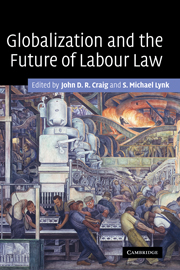Book contents
- Frontmatter
- Contents
- Notes on contributors
- Acknowledgements
- Table of cases
- List of abbreviations
- Introduction
- PART I Perspectives on globalization
- PART II International labour standards
- PART III The European Union
- PART IV The Americas
- 9 Labour rights in the FTAA
- 10 Globalization and the just society – core labour rights, the FTAA, and development
- 11 The future of labour integration: the South American perspective
- PART V The ILO
- PART VI Labour rights
- Bibliography
- Index
9 - Labour rights in the FTAA
Published online by Cambridge University Press: 23 July 2009
- Frontmatter
- Contents
- Notes on contributors
- Acknowledgements
- Table of cases
- List of abbreviations
- Introduction
- PART I Perspectives on globalization
- PART II International labour standards
- PART III The European Union
- PART IV The Americas
- 9 Labour rights in the FTAA
- 10 Globalization and the just society – core labour rights, the FTAA, and development
- 11 The future of labour integration: the South American perspective
- PART V The ILO
- PART VI Labour rights
- Bibliography
- Index
Summary
Introduction: rejection or engagement?
Negotiations on the Free Trade Agreement of the Americas (FTAA) bring advocates of a strong social dimension in hemispheric economic integration to a fork in the road: a path of rejection and a path of engagement. On the rejection path, critics point to flaws and failings in existing trade-labour linkages in the Americas. Ten years after the adoption of the North American Free Trade Agreement (NAFTA) and its labour side agreement, the three member countries of the North American Agreement on Labour Cooperation (NAALC), demonstrate job and wage stagnation, growing inequality in labour markets, and continuing violations of workers' rights.
Similarly, more than a decade after the creation of the Common Market of the Southern Cone (Mercosur) and five years after its Social-Labour Declaration, workers in Brazil, Argentina, Paraguay and Uruguay face wrenching problems of job and wage losses and social inequality. So do workers of the Caribbean Community (CARICOM), in spite of the far-reaching Declaration of Labour and Industrial Relations Principles (1993) and the Charter of Civil Society (1994). In sum, the social provisions of trade pacts have failed to protect human rights, workers' rights and labour standards.
The flaws and failings of these labour instruments lead to one conclusion: an effective workers' rights regime in the FTAA is an impossible goal, and seeking one is a lost cause.
- Type
- Chapter
- Information
- Globalization and the Future of Labour Law , pp. 245 - 273Publisher: Cambridge University PressPrint publication year: 2006
- 3
- Cited by



